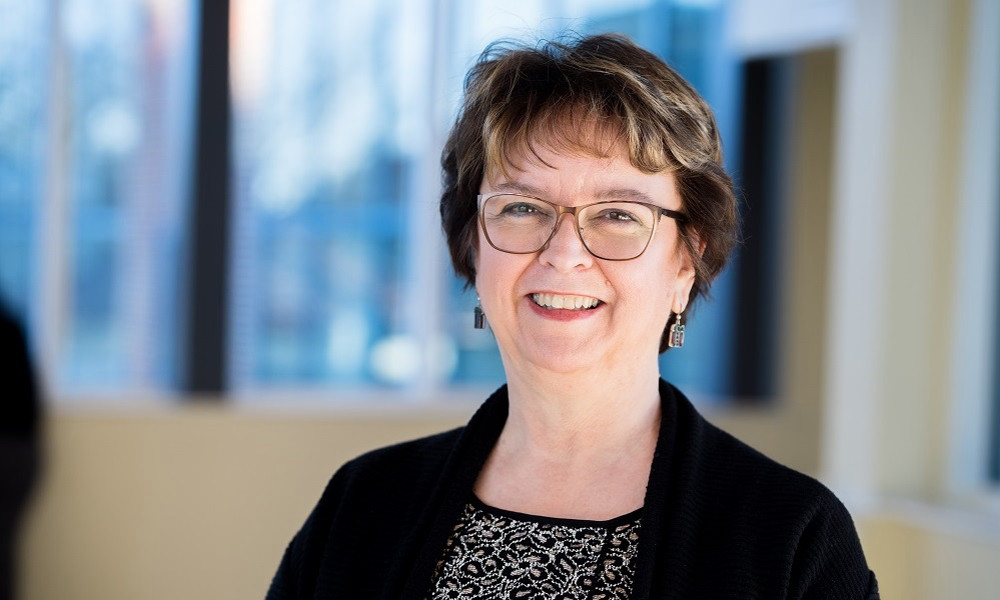Celebrating a Career of Dedication and Achievement
News
SUMMARY: Lynette Michael retires after decades of dedication to JMU. Her leadership and commitment shaped countless experiences for students, faculty, and colleagues.
Graduate Education at JMU has advanced tremendously during the past two decades. Through the supervision of her team, and implementation of technology and automation, our Director of Graduate Admissions has implemented processes that made this possible. Lynette Michael helped JMU’s graduate enterprise advance while maintaining a highly personalized customer-orientation that has helped applicants, students and graduate programs faculty. The Graduate School is sad to report that Lynette Michael is retiring. We are also pleased to take this opportunity to celebrate a career filled with accomplishments.
Lynette started work at JMU in 1996 as a part-time Program Support Technician within the College of Education before transitioning to a full-time role in the Graduate School. She was appointed Director of Graduate Admissions in 2004. "Every day is different," she shares; when asked what has kept her at JMU for so many years she said that "I like the challenge. I start with a plan—X, Y, and Z—but then A, B, and C come along, and my priorities shift. It’s never boring and that’s what I love about it."
When Lynette first joined JMU, the university didn’t use technology in admissions. "Students mailed in paper applications" she recalls that for every applicant "we would type up cards with their name, address, phone number, and the program they were interested in." We would then color-code them with paperclips to track their status. "Later, I created a system using file folders and an Admission Approval From to make it more efficient," she recalls labeling folders with a C or U (Conditional or Unconditional Admission) to track admission status. When students advanced from conditional to unconditional admission, staff simply changed the label.
With the advent of the Internet and software that is designed for university admissions, Lynette and her team moved graduate applications to online forms. Lynette recalled that this required a big effort, and it was very challenging. She says that she loves technology, but the implementation was never easy. “It was a lot of work during the implementation stages. We had run both systems in parallel to make sure no records are lost and that the new system was working."
The transition from paper to digital applications was a challenge for everyone. Lynette shared how some departments had their own separate applications, in addition to the common application used by The Graduate School. To streamline the process, Lynette implemented program-specific requirement page within the electronic application. Programs could now add unique, program-specific requirements for admissions. This way departments could collect any information they needed using only the one online application.
But while prospective students only completed an online application, the review process still was not automated. Graduate School staff members manually created a shared network folder for each program, and within that, a folder for each applicant. The online application was put into the appropriate folder along with other information that was gathered by staff members such as letters of recommendation and test scores. Program faculty reviewed materials in these folders and submitted a paper form to recommend unconditional, conditional, or provisional admission or recommend that an applicant not be admitted. These forms were sent by campus mail to the Graduate School office where staff created admission letters using Microsoft Word and created admission acceptance packets that were mailed to each applicant. Mailing materials was slow, and it made admitting international students from some countries nearly impossible.
Meeting the continuing challenge, Lynette and Graduate School staff implemented CollegeNET Admit. Admit permitted programs to review candidate materials online from anywhere Internet access was available. CollegeNET Admit helped staff create letters of admission and track candidate responses to admission offers. Finally, now our admission processes were truly online. No more paper forms. No more reliance on mail for communicating decisions. This was an amazing leap forward that we now take for granted.
In addition to her innovations in admission, Lynette developed training materials and an orientation program for new graduate program directors after she realized that they need substantial training and support. New program directors were skilled faculty members who had years of experience teaching, advising, and pursuing scholarship in their areas of study. Many had no prior administrative experience, or if they had this experience, it did not include the automated admission processes now implemented at JMU. To assist programs, Lynette developed a program director’s manual and an orientation program to introduce them to essential processes. Sessions were conducted individually, because each program had unique program requirements, admission rubrics, and methodologies for selecting candidates for admission. These materials and training, combined with other efforts like training regarding unconscious bias and wholistic review, helped advance graduate admissions at JMU.
With all these accomplishments, you might think that Lynette is the kind of person who works hard without play. But Lynette has a wonderful interpersonal side as well. Lynette appreciates how supportive and fun her colleagues are. “We help each other out, and it's comforting to know that someone is always willing to lend a hand, we’re like family." She said that the laughter shared during lunch breaks and the little moments of support made the workday very enjoyable for everyone.
Lynette attributes much of her success to faith. "I give God all the glory for everything I've done," she says. Her leadership, innovation, and attention to detail have been key to her success.
Lynette’s hard work has made JMU better for students and faculty alike. She values her time here, the challenges, the people, and the impact she has made along the way.
